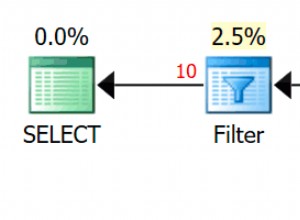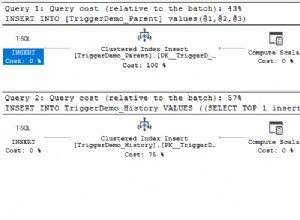Aucune idée de la raison pour laquelle vous avez besoin de deux colonnes pour incrémenter automatiquement les valeurs, cela ne sert à rien... mais si vous insistez -
Vous pouvez le faire dans un UDF ou un SP de cette façon, vous avez plusieurs colonnes qui incrémentent automatiquement une valeur.
EXEMPLE #1 :PROCÉDURE STOCKÉE (SP)
Tableau
CREATE TABLE tests (
test_id INT(10) NOT NULL PRIMARY KEY AUTO_INCREMENT,
test_num INT(10) NULL,
test_name VARCHAR(10) NOT NULL
);
Procédure stockée
DELIMITER $$
CREATE PROCEDURE autoInc (name VARCHAR(10))
BEGIN
DECLARE getCount INT(10);
SET getCount = (
SELECT COUNT(test_num)
FROM tests) + 1;
INSERT INTO tests (test_num, test_name)
VALUES (getCount, name);
END$$
DELIMITER ;
Appeler le SP
CALL autoInc('one');
CALL autoInc('two');
CALL autoInc('three');
Consultez le tableau
SELECT * FROM tests;
+---------+----------+-----------+
| test_id | test_num | test_name |
+---------+----------+-----------+
| 1 | 1 | one |
| 2 | 2 | two |
| 3 | 3 | three |
+---------+----------+-----------+
EXEMPLE #2 :FONCTION DÉFINIE PAR L'UTILISATEUR (UDF)
Tableau
CREATE TABLE tests (
test_id INT(10) NOT NULL PRIMARY KEY AUTO_INCREMENT,
test_num INT(10) NULL,
test_name VARCHAR(10) NOT NULL
);
Fonction définie par l'utilisateur
DELIMITER $$
CREATE FUNCTION autoInc ()
RETURNS INT(10)
BEGIN
DECLARE getCount INT(10);
SET getCount = (
SELECT COUNT(test_num)
FROM tests) + 1;
RETURN getCount;
END$$
DELIMITER ;
Insérer en utilisant l'UDF
INSERT INTO tests (test_num, test_name) VALUES (autoInc(), 'one');
INSERT INTO tests (test_num, test_name) VALUES (autoInc(), 'two');
INSERT INTO tests (test_num, test_name) VALUES (autoInc(), 'three');
Consultez le tableau
SELECT * FROM tests;
+---------+----------+-----------+
| test_id | test_num | test_name |
+---------+----------+-----------+
| 1 | 1 | one |
| 2 | 2 | two |
| 3 | 3 | three |
+---------+----------+-----------+
Ceux-ci ont été testés et vérifiés. Personnellement, j'utiliserais la fonction, c'est plus flexible.




